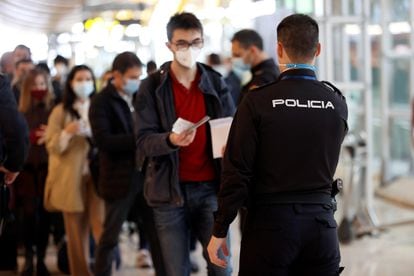A police officer controls the passage of travelers at the Barajas airport, in Madrid, on March 19.Chema Moya / EFE
Spain details the requirements for access to the country as of Monday: vaccinated passengers will be allowed entry from 14 days after receiving the complete guideline for a drug approved by the European Medicines Agency (EMA) or the World Organization of Health (WHO).
Although there will be exceptions with India, Brazil and South Africa.
In addition, for trips already allowed for just cause or for leisure (with those of the European Union and a dozen third countries) that require a negative diagnostic test, the antigen tests will be valid.
More information
The requirements to travel without restrictions to Spain from June 7: vaccinated at least 14 days before
Spain reopens tourism without restrictions for the United Kingdom on Monday and June 7 for those vaccinated
The entry of those already vaccinated was known since the announcement of the President of the Government, Pedro Sánchez, on May 21 in Fitur. But it was not until this Saturday when it was made official with its publication in the
Official State
Gazette (BOE). Thus, it is confirmed that immunized travelers can only enter the country once 14 days have elapsed since the last puncture and they have the full regimen — the Janssen single dose or the second dose for drugs that require two. The drugs accepted to date by the EMA or the WHO are Pfizer, Moderna, AstraZeneca and Janssen, Sinopharm and Sinovac-Coronavac. Minors who accompany them may also enter. In addition, the text adds some exceptions with the so-called risk countries.
“In the case of people arriving at any airport located in the Kingdom of Spain, with or without intermediate stopovers, on flights from airports located in third countries, who are quarantined by Order of the Ministry of Health [India], While that order is in force, only the exceptions set forth in letters d), e) and i) will apply, except in the case of persons residing in Spain or Andorra, or spouses of Spanish citizens or partners with whom they maintain a union analogous to the conjugal one registered in a public registry, or those ascendants and descendants who live in their care, provided they travel with or to meet with the Spanish citizen ”, explains the BOE. Spain includes this safeguard to protect itself from new variants of the virus, so the list may vary over time.
With a mandatory 10-day quarantine, according to Health, only India is currently there. Although there is also a limitation to travel from Brazil or South Africa that, in practice, excludes them from entering Spain with being vaccinated. Specifically, they can only access from these Spanish or Andorran national countries, residents in Spain or Andorra or passengers in international transit to a non-Schengen country with a stopover of less than 24 hours (without leaving the airport transit area). The aeronautical personnel necessary to carry out air transport activities can also enter.
The new order of the Ministry of the Interior published this Saturday adds another justified assumption by which it is possible to travel to Spain in the case of students. “Students who carry out their studies in the Member States or Schengen Associated States and who have the corresponding permit or visa for long-term stay, provided that they go to the country where they are studying, and that the entry occurs during the academic year or the previous 15 days. If the destination is Spain and the duration of the stay is up to 90 days, it must be proven that the studies are carried out in an authorized teaching center in Spain, registered in the corresponding administrative registry, following a full-time program during this phase and in person, and that leads to obtaining a degree or certificate of studies ",pick up the text.
Facilitate tourism
Despite this notable change and the possible entry of travelers from outside the EU who had not been able to do so for more than a year, the most anticipated news by the tourism sector is the change in the diagnostic tests accepted in border control.
The use of antigen tests, cheaper and with almost instantaneous results, has been one of its great demands.
And now, finally, it will be valid to use this test for passengers who are required to have a diagnostic test carried out in the 48 hours prior to entering Spain (either for tourism or for a just cause).
This change is fundamental, at the gates of the start of the summer tourism campaign, since residents in Germany or France - two of the main source markets - were required to present a negative PCR so far. Not so the United Kingdom due to its low accumulated incidence, although London keeps Spain on the
amber list
. In this way, those German tourists who want to plan their holidays in the country already know that a part of the fixed expenses will be reduced.
In addition, with the changes that will take effect on Monday, all tourists from the Schengen area will be able to access the country with the requirements of the EU digital certificate (which begins its journey on July 1). That is, they will be able to enter if they document that they are vaccinated, a negative PCR or antigen test, or a certificate that they have overcome the coronavirus.
These changes are viewed with some suspicion in Europe. So much so that the Commission asked Spain for consistency on Friday on the relaxation of travel restrictions due to the coronavirus. "It is your responsibility, but we ask for consistency for the good of the citizens of the European Union," said the Commission's chief spokesman, Éric Mamer, at a press conference in Brussels. According to Mamer, the community recommendation endorsed by the Twenty-seven establishes that a negative PCR must be requested from all travelers.

